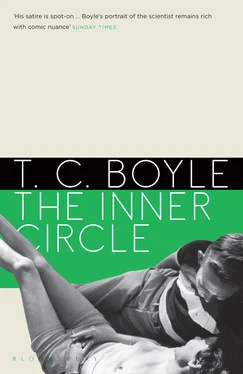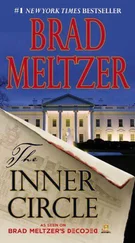But a word about Iris, because I see I haven’t given her her due here — and she is central to all this, to Prok’s story, that is, because on that day at the end of May in 1941 she was to become the fourth member of the inner circle, taking her place alongside Prok, Mac and me, and everything that’s happened since concerns her as much as it does anyone else. She was — well, she had an independent streak. She thought for herself. Formed her own opinions. And while I didn’t necessarily recognize it at the time, so caught up was I in the project and what we’d set out to accomplish, I would say that her independence grew over the years until it was almost antithetical — a rebellion, very nearly a rebellion — against what we believed in. But that’s off subject. Iris. Let me put her down here in a few words. Beautiful, certainly. Stubborn. Witty (I’ve never encountered anybody so quick except maybe Corcoran). Smart as a whip. Organized. She played clarinet throughout high school and college, and until her senior year, when we were already married, she put on a starched uniform every Saturday morning and marched across the shimmering greensward with the band. She was a conscientious student, though her grades weren’t nearly as high as mine (not that it matters, of course), and she had a stunning artistic sense, able to make a household, our eventual household, that is, look nothing short of elegant on just the barest of means. What else? Her smile. I wanted to sail away on that smile, and I did, for a long while. And her sexual response, of course — I can’t leave that out, not in an account of this nature. What I’d told Prok was true, more or less. She’d opened up to me — she loved me — and as we became more acclimated to one another, as we spent more and more time in the backseat of Prok’s car and then, as the weather warmed, on a blanket in a hidden corner of the park, she let her passionate side emerge. We began to experiment, and she was increasingly enthusiastic, on several occasions even climbing atop me in the female-superior position without any prompting on my part. And while she wouldn’t dream of using crude language in any situation, she used it then, used it when her eyes began to roll back in her head and her hands jerked at my shoulders as if she wanted to pull me right down inside her rib cage and beyond, into the ground beneath, and deeper, deeper yet: “Oh, fuck,” she’d say. “Fuck, cunt, fuck.”
Prok had arranged for the justice of the peace to perform a simple civil ceremony under the persimmon tree at the rear of the house, and he’d gone to considerable trouble to move the piano out of doors as well so that we could have the bridal march to put the official seal on the ceremony. (I haven’t mentioned that Prok had dreamed of becoming a concert pianist when he was a boy and gave it up only when he’d discovered his true vocation in science. He was good, as accomplished as anyone you might find on the stage in the concert hall down the street, and he serenaded us not only with the wedding march that afternoon, but with a host of selections from Peer Gynt, which went eerily well with the fairy-tale setting.) Prok at the piano, Iris in my arms, Tommy at my side: it was as close to heaven as I’d yet come. And my mother, of course. She was there with Aunt Marjorie, a small distant smile on her face, and I think she drank too much that day (rum drinks — Prok had gone mad for them, not so much because he enjoyed drinking all that much himself, but because he was swept away with the idea of collecting recipes, and so we had Zombies that afternoon, and something called Charleston Cup in a crystal bowl set in a bed of ice). She didn’t cry, though Mac did, briefly. For my mother, never one to sentimentalize (she’d described herself to me as a fatalist on more than one occasion), the ceremony must have brought her back to her own wedding day so many years ago and the wreckage that had been left in place of the dreams of a young bride. Still, she did approve of Iris because she felt that Iris had grit and grit was the only thing my mother understood in terms of getting by — you needed grit and toughness, especially if you were a woman, in order to survive in a world of war and depredation and boating accidents.
Somebody — Tommy, the maid of honor, Paul Sehorn — tied a potpourri of old pans and graters to the bumper of the Nash, and Prok, erect as a chauffeur up front with my mother and Mac erect beside him, grimaced at the noise all the way to the station while Iris and I clung to each other on the soft wide leather seat we knew so well.
Our honeymoon took its cue from the one Prok and Mac had pioneered twenty years earlier — that is, we went on an extended camping trip, not to the White Mountains of New Hampshire as the Kinseys had done, but to the Adirondacks, a region that had always fascinated me as a boy growing up among the scrub hills and dunes on the shores of Lake Michigan. Iris wasn’t much of a camper, nor was I, if truth be told. But it seemed like an adventure, and it had the added virtue of being cheap (which was one of the motivating factors for Prok back in his day, though of course he was a naturalist who’d been camping all his life and could happily have subsisted on tubers, berries and mast if he had to, something, needless to say, I was neither able nor willing to do). To give her credit, Iris was game, though she’d lobbied for a more conventional honeymoon in Niagara Falls, and we did pay a visit there and spend a single night in a hotel room that cost as much as the rest of the trip combined. Looking back on it, I do have fond memories of that journey — Iris in a swimsuit and horripilated flesh perched over a lake barely clear of ice, the smell of the pine woods and the intoxicating smoke of our cookfires, the touch of her hand, our vagrant lovemaking in a sleeping bag designed for one in the core of a blackness absolute and a silence deeper than all of history — but overall it did have its limitations. I won’t really bother to go into detail — it’s not relevant here — but I will say that the insects were merciless, the tent barely adequate to its function, the weather horrible and the ground as hard as a rail rolled off the line in a Gary steel mill.
None of that seemed to matter (or it mattered, but we fell all over ourselves trying to assure each other it didn’t), because we were together, just the two of us, for the first time in our lives. We made an erotic playground of the big white bed in the hotel room in Niagara Falls and engaged in activities — fellatio, cunnilingus, rear entry — I’d been too timid, and too hurried, to try with Mac. Ironically, though we didn’t know it at the time, the two weeks of our honeymoon would be our last opportunity to experience that sort of freedom for almost a full year. That is, when we got back to Bloomington, Iris returned to her dorm — where she would stay on for summer session in the hope of accelerating her matriculation — and I to Mrs. Lorber’s. Though we spent every available minute tramping through apartments, spare rooms, converted basements and various outbuildings posing as rental units, we found nothing we could both tolerate and afford, and so, though we were married now and though I was an adult with a full-time job, we went back to the blanket in the park and the backseat of Prok’s antiquated Nash (not that Prok was unsympathetic, but you have to understand that the lion’s share of the money for the project was at that time coming out of his own pocket — that is, from his earnings at IU and the royalties on his biology textbook — and it was all but impossible for me to expect him to raise my salary even by a few dollars a week).
In any case, Iris and I made do, as countless other separated couples had throughout the Depression, and we saved our money and painted vivid dreams of our first household as the summer imperceptibly coalesced with the fall and the news from abroad went from bad to worse. It was a strange, unsettling period, that interlude between our marriage and the war. On the one hand we were hopeful, and yet on the other, everything we did, even the simplest things, gave rise to doubt — why bother to put that extra dollar away, look after the condition of your teeth and your diet or dare to dream about your wife and an apartment and the future when the ax was poised to fall? A lot of men I knew despaired. Others just burned up all they had of energy and resources, day and night, carpe diem.
Читать дальше












